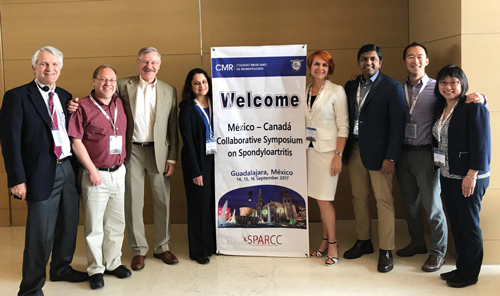Summer 2018 (Volume 28, Number 2)
SPARCC: 2017 Meeting Summary
Download PDF
By the SPARCC Executive Committee
The Spondyloarthritis Research Consortium of Canada (SPARCC) facilitates knowledge transfer and dissemination of breakthroughs in spondyloarthritis (SpA) research by conducting annual scientific meetings and patient symposia in collaboration with the Canadian Spondylitis Association (CSA). In 2017, these events took place in Calgary, in a collaboration between the University of Calgary (spearheaded by Dr. Dianne P. Mosher) and the SPARCC Executive Committee.
In Calgary, SPARCC also conducted an event exploring new collaborative research opportunities. This highlighted important future directions in SpA research: (i) new disease taxonomies (ii) biomarker opportunities and challenges (iii) multi-omic platforms (iv) the gut-joint interface in chronic immune-mediated inflammatory conditions (v) advanced tools for imaging, and (vi) harnessing large databases for translational success. Members of the Snyder Institute and the McCaig Institute at the University of Calgary and SPARCC investigators joined forces in this initiative. In addition, a SPARCC Continuing Medical Education (CME) workshop for practicing rheumatologists was conducted, attended by rheumatologists and residents, nurses and allied health practitioners alike. This provided an update in the assessment of SpA, data collection and entry, and best practices for clinic policies and procedures. We shared the strategies used by SPARCC in the diagnosis and treatment of patients with ankylosing spondylitis (AS) and psoriatic arthritis (PsA), with a special focus on the role of new therapies. This workshop also covered the management of extra-articular manifestations of SpA particularly in the fields of dermatology, ophthalmology and gastroenterology. The outline of Calgary events was as follows:
- November 16th, 2017: Spondyloarthritis Research Workshop Building Blocks for a Precision Medicine Approach to Immune-mediated Inflammatory Diseases
- November 17th, 2017: SPARCC CME Workshop: (Optimal Management of Spondyloarthritis)
- November 17th, 2017: SPARCC Annual Scientific Meeting
- November 18th, 2017: SPARCC-CSA Patient Forum on Spondyloarthritis (SpA)

In addition, SPARCC expanded its horizons internationally and accepted the invitation of the Mexican College of Rheumatology (MCR) to partner in an international SpA symposium in Guadalajara, Mexico. This meeting focused on recent developments in SpA research, promoted interactions between clinicians and researchers, and prioritized future collaborative research goals.
SPARCC Pilot Projects
Since 2009, SPARCC provides seed funding annually to support research proposals aligned with its primary objective of advancing SpA-related research. These pilot project grants are awarded on a competitive basis to innovative proposals in the area of SpA research. The program is open to Canadian investigators and the maximum amount per award is $25,000 for one year; membership in SPARCC is not a prerequisite for submission. Priority is given to innovative new research themes in SpA with potential for capturing future peer-reviewed funding. For 2016-2017 periods, the following two pilot projects were funded and were discussed during the scientific meeting in Calgary November 17, 2017.
- Exploring the Disease-Modifying Effects of Psoriasis and/or Colitis on Disease Features and Severity in Axial Spondyloarthrits
-
Principal Investigator: Sibel Zehra Aydin,
University of Ottawa
Co-investigators: Drs. Zaid Jibri and Sibel Ureyen
- Gadolinium Enhancement in Pediatric Sacroiliac Joint Magnetic Resonance Imaging: Is it Really Necessary?
-
Principal Investigator: Dr. Dax G. Rumsey,
University of Alberta
Co-investigators: Drs. Jacob Jaremko, Shirley Tse, Jennifer Stimec, Vimarsha
Swami, Nina Stein, Michele Batthish and Andrea Doria
|
